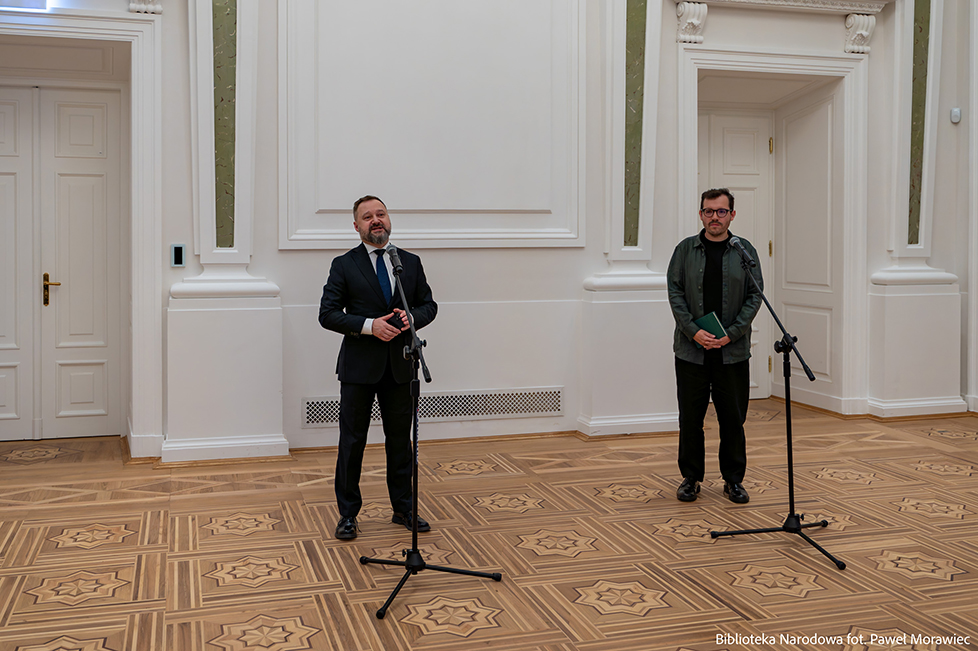Miłosz. Return. Exhibition in the Palace of the Commonwealth now open

The new exhibition Miłosz. Return opened on Friday, 28 June 2024 in the Palace of the Commonwealth. It features original manuscripts, books, photographs and objects that came to the National Library from the poet's home in Berkeley and his flat in Kraków. Together, they form a visionary journey through moments in the writer's life that are impossible to recall without poetry.
Director General of the National Library, Dr Tomasz Makowski, opened the exhibition with the following words: With the exhibition we are opening today and our celebration tomorrow of Jan Kochanowski's name day, we hope to encourage the next generation to learn about Czesław Miłosz's life and work – not just my own and previous generations, who know his work as a matter of course, but those who have not had the opportunity to learn about him. I would like to take this moment to say thank you. First and foremost, to Tony Miłosz for his decision to donate his father's private archive to the National Library, the archive which was in Grizzly Peak. That decision was built on trust – trust in the National Library. The trust that the National Library has built up among those who hold valuable private archives is priceless – particularly as we are an institution that opened 277 years ago and so take a slightly longer perspective than tomorrow, next week or next year. Thank you for that trust. Not only the private archives but also the deposits that were at Yale University have made their way here, including the priceless notebooks that feature extensively in the exhibition. A very warm welcome also to Joanna Miłosz, and our sincerest thanks for trusting us with the donation of the second part of the archive, which is of extraordinary importance to us: the Miłosz family archive and the archive of Andrzej Miłosz, Czesław Miłosz's brother. The significance of this archive should be clear, not least because the oldest family document dates back to the 16th century. We are delighted that the Miłosz family archive has found a permanent, secure home in the National Library.
Michał Szymański, curator of the exhibition, thanked everyone who was involved in organising it: The idea for this exhibition grew in a sense out of my personal, individual experience. It is a highly personal statement about Miłosz from somewhere deep inside me – a statement that stems from the many years I have spent day in, day out with Czesław Miłosz's archives and from my daily contact with the thing left behind by the great poet. A poet who is no longer with us, but whose possessions remain. In putting together this archive, I have tried to understand and capture that experience somehow. The exhibition Miłosz. Return is a way for me to express this experience and try to talk about it. It is also an opportunity to look at Miłosz from a certain distance, from the other side, to consider what in Miłosz continues to live, what resonates with us. But in a very subtle way, not reducing him to summary ideas or current trends. For this reason the exhibition is traditional in the sense that it focuses on things, on manuscripts. It derives from the conviction that Miłosz can be brought back to us through things, and that this is also a bringing back of Miłosz's things, of materiality.
Czesław Miłosz (1911–2004) was a poet, essayist, translator and one of the most eminent writers of the 20th century. He was born in Szetejnie, not far from Kiejdany, in the Russian Empire, in the territory of the former Great Duchy of Lithuania. He spent his youth in Vilnius, a city within Polish borders at the time, where he completed his studies at the Stefan Batory University and published his first two volumes of poetry: A Poem on Frozen Time and Three Winters. In the second half of the 1930s he moved to Warsaw, where he remained during the German occupation. His third volume, Rescue, appeared in late 1945, a ground-breaking book for Polish poetry, while the poet gave his support to the new regime and was sent on a diplomatic posting to the United States. In 1951 he decided to break with the Communist authorities, one of the first intellectuals in the Eastern Bloc to do so. He settled in France and established a permanent relationship with the émigré monthly Kultura published by Jerzy Giedroyć. In 1960 he moved with his wife and sons to America and started teaching literature at the University of California at Berkeley. In 1980 he received the Nobel Prize for Literature, and, after years of being banned, his works began being appearing again in Poland. After 1989 he regularly returned to Poland and became one of the key figures in the country's cultural life. In the last decade of his life he split his time between Kraków and California. He died in his Kraków apartment on August 14, 2004, aged 93.
The exhibition is open daily during the opening hours of the Palace of the Commonwealth and runs from 29 June to 14 October 2024. Admission is free.